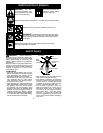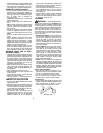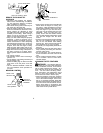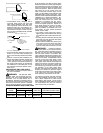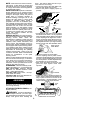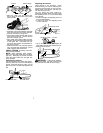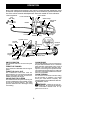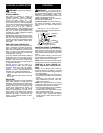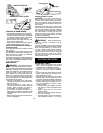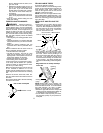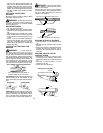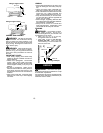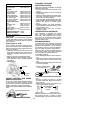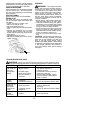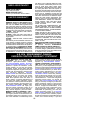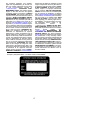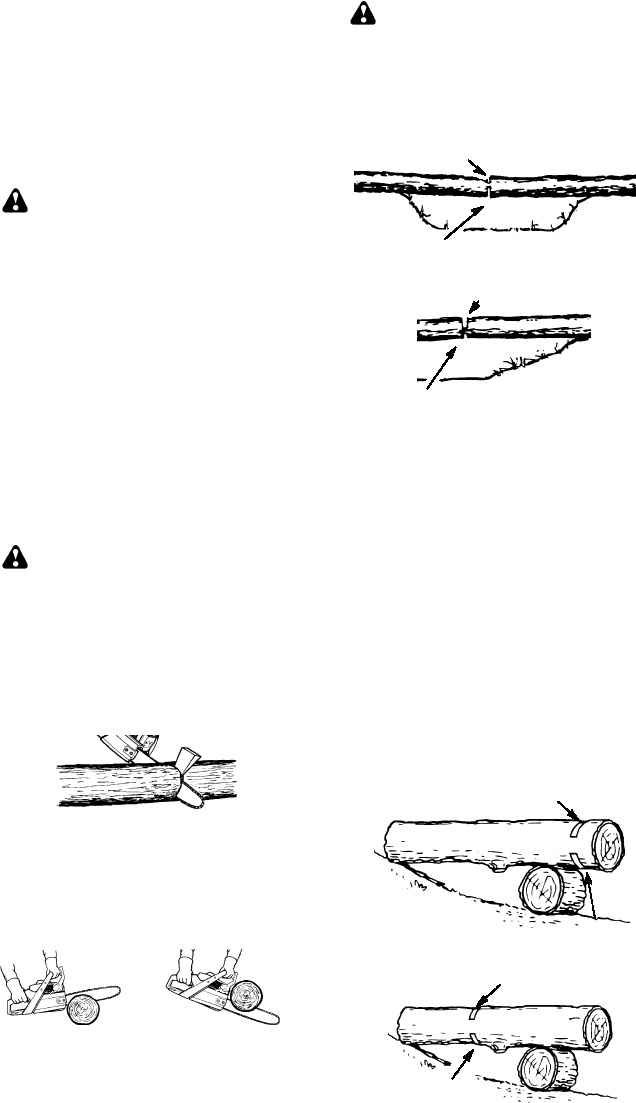
12
S
DO NOT cut down a partially fallen tree
with your saw. Be extremely cautious with
partially fallen trees that may be poorly
supported. When a tree doesn’t fall com-
pletely, setthesawaside andpull down the
tree with a cable winch, block and tackle,
or tractor.
CUTTING A FALLEN TREE
(BUCKING)
Bucking is the term used for cutting a fallen
tree to the desired log size.
WARNING:
Do not stand on the log
being cut. Any portion can roll causing loss
of footing and control. Do not stand downhill
of the log being cut.
IMPORTANT POINTS
S
Cut only one log at a time.
S
Cut shattered wood very carefully; sharp
pieces ofwood could beflung towardoper-
ator.
S
Use a sawhorse to cut small logs. Never
allow another person to hold the log while
cutting and never hold the log with your leg
or foot.
S
Do not cut in an area where logs, limbs,
and roots are tangled such as in a blown
down area. Drag the logs into a clear area
before cutting by pulling out exposed and
cleared logs first.
TYPES OF CUTTING USED FOR
BUCKING
WARNING:
If saw becomes
pinched or hung in a log, don’t try to force it
out. You can l osecontrol of t he sawresulting
in injury and/or damage t o the saw. Stop the
saw, drive awedge ofplastic orwood into the
cut until the saw c anbe removed easily. Re-
start thesawandcarefully reenter thecut. To
avoid kickback and chain damage, do not
use ametal wedge. Do not attempt to restart
your saw when i t is pinched or hung in a log.
Use a wedge to remove pinched saw
Turn saw
OFF
and use a plastic or
wooden wedge to force cut open.
Overcutting begins onthetop sideof the log
with the bottom of the saw against the log.
When overcutting use light downward pres-
sure.
Overcutting Undercutting
Undercutting involves cutting on the under-
side of the log with top of sawagainst thelog.
When undercutting use light upward pres-
sure. Hold saw firmly and maintain control.
The saw will tend to push back toward you.
WARNING:
Never turn saw upside
down to undercut. The saw cannot be con-
trolled in this position.
Always make your first cut on the compres-
sion side of the log. The compression s ideof
the log is where the pressure of the log’s
weight is concentrated.
Second cut
First cut on compression side of log
First cut on compression side of log
Second cut
BUCKING WITHOUT A SUPPORT
S
Overcut through
1/3
of the d iameter of the
log.
S
Roll the log over and finish with a second
overcut.
S
Watch for logs with a compression side to
prevent the saw from pinching. See il-
lustrations for cutting logs with a c ompres-
sion side.
BUCKING USING A LOG OR
SUPPORT STAND
S
Remember your first cut is always on the
compression side of the log. (Refer to the
illustrations below fory ourfirst andsecond
cut)
S
Your first cut should extend
1/3
of the
diameter of the log.
S
Finish with your second cut.
1
st
Cut
2
nd
Cut
Usingalogforsupport
2
nd
Cut
1
st
Cut



